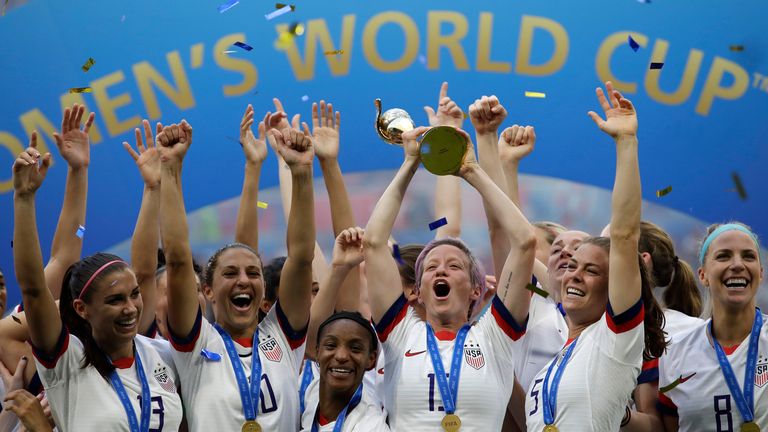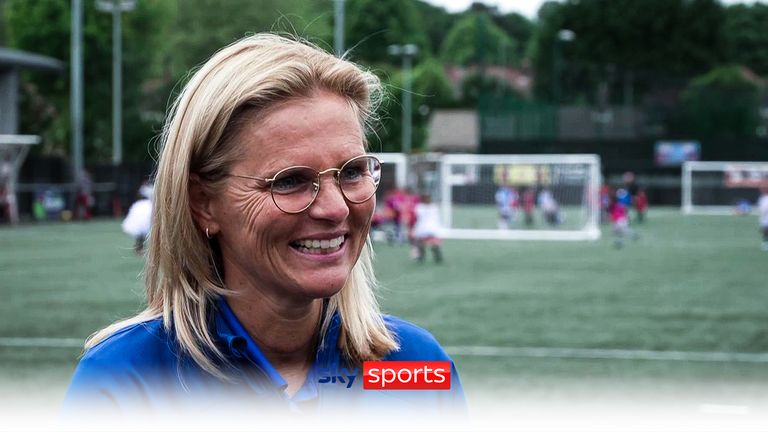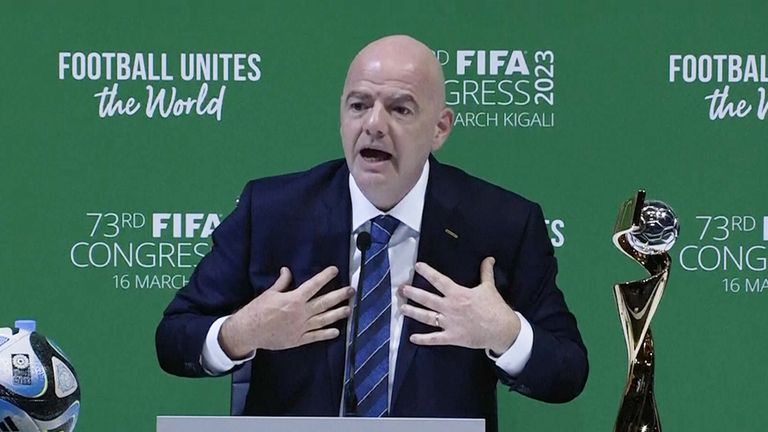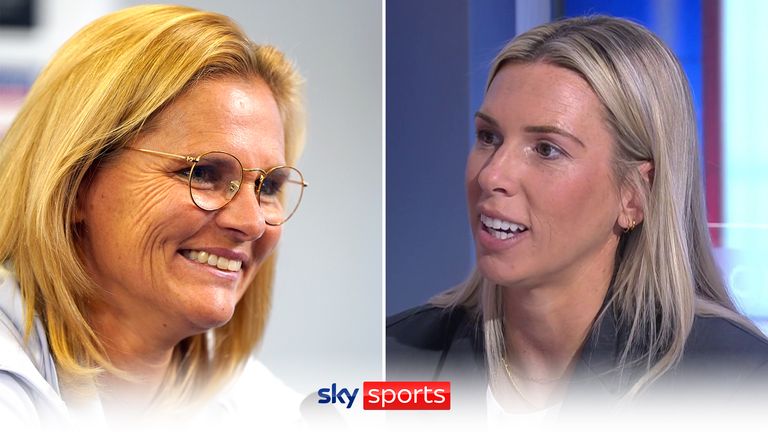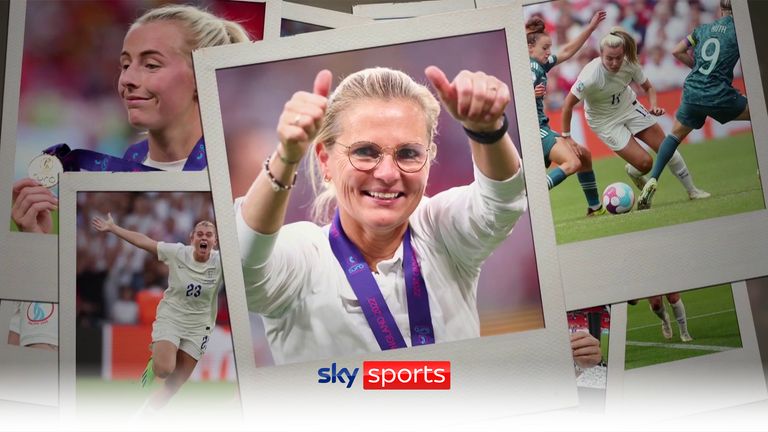Women's World Cup: BBC and ITV clinch late rights deal to show tournament
In May, Gianni Infantino, the head of FIFA, threatened not to show this year's tournament in five European countries - the UK, France, Germany, Italy and Spain - in a row over money; tournament, jointly hosted by Australia and New Zealand, starts July 20
Wednesday 14 June 2023 22:27, UK
All 64 matches in this summer's women's World Cup will be broadcast live on terrestrial TV in the UK after the BBC and ITV clinched a late joint rights deal.
The broadcasters issued a joint statement confirming the arrangement, which includes live audio commentary on BBC 5 Live and 5 Sports Extra.
The BBC and ITV will share the matches, including England's Group D openers against Haiti, Denmark and China, with the exception of the final, which will be broadcast on both BBC One and ITV1.
- Leah Williamson confirms 'World Cup dream is over' after rupturing ACL
- Sarina Wiegman: Beth Mead not in World Cup plans
- Get Sky Sports | Download the Sky Sports App
The tournament, which is jointly hosted by Australia and New Zealand, kicks off on July 20 when New Zealand face Norway in Auckland.
The deal also means countries including Germany, Spain, France and Italy now have TV contracts in place.
Barbara Slater, director of BBC Sport, said: "We have shown every Women's World Cup on the BBC since 1999 and we are happy to extend our partnership with FIFA for the upcoming tournament.
"The growth of the women's game is extraordinary."
ITV will split games between ITV1 and ITV4, with catch-up on ITVX.
ITV director of Sport Niall Sloane said: ""We're delighted to be able to bring comprehensive coverage of the Women's World Cup, free to air to our audiences with both live and highlights broadcasts across ITV and ITVX."
The new deal between FIFA and the EBU expands on a previous commitment to free-to-air broadcast across the continent, adding the five major markets of the UK, France, Germany, Italy, and Spain, as well as Ukraine.
FIFA president Gianni Infantino called the deal "a huge promotional and exposure opportunity for women's football, which is a top priority for us in line with FIFA's commitment to long-term development of the sport."
How World Cup rights deal saga was resolved
In May, Infantino threatened not to show this year's tournament in five European countries - the UK, France, Germany, Italy and Spain - in a row over money.
Infantino branded offers for the tournament, which is being sold as a standalone package where historically it was bundled with the men's World Cup, as "a slap in the face of all the great FIFA Women's World Cup players and indeed of all women worldwide" in an Instagram post.
Infantino claimed broadcasters had offered FIFA between $1m (£800,000) and $10m (£8m) for the rights, compared with $100m (£80m) to $200m (£160m) for the men's World Cup.
An ex-FIFA council member hit back at those "outrageous" claims.
Former council member Moya Dodd has spoken out against Infantino and FIFA's methods, saying they had historically undervalued the tournament and used it to inflate the price of the tender process for the men's World Cup.
"Now that FIFA has decided to sell the rights separately, it's no surprise that the buyers don't want to pay the same big numbers twice," Dodd told the Sydney Morning Herald.
"Effectively, the industry was trained to pay big money for the men's World Cup and treat the women's equivalent as worthless. At the same time, the women were told they didn't deserve prize money or equal pay because they didn't bring the revenues.
"It's actually quite outrageous. For FIFA to now say that all women's revenues will go straight into women's football overlooks the fact that the value of the women's rights have until now been used to inflate the value of men's football."
Dodd said that instead of threatening broadcasters FIFA should review all of its bundled deals and attribute a fair proportion to the women's game.
"If in fact the Women's World Cup gets 50-60 per cent of the viewers of the men's, as FIFA says, that should amount to a sum in the billions," she added.
In his post on Instagram which prompted Dodd's response, Infantino had written: "Today, I have repeated my call for broadcasters to pay a fair price for FIFA Women's World Cup 2023 media rights. We did our part: FIFA has raised the prize money to USD 152 million, treble the amount paid in 2019 and 10 times more than in 2015 (before I became FIFA president).
"However, the offers from broadcasters, mainly in the 'Big 5' European countries, are still very disappointing and simply not acceptable, especially considering that: 1) 100 per cent of any rights fees paid would go straight into women's football, in our move to promote actions towards equal conditions and pay; 2) Public broadcasters in particular have a duty to promote and invest in women's sport.
"3) The viewing figures of the FIFA Women's World Cup are 50-60 per cent of the men's FIFA World Cup (which in turn are the highest of any event), yet the broadcasters' offers in the 'Big 5' European countries for the FIFA Women's World Cup are 20 to 100(!) times lower than for the men's FIFA World Cup; and 4) concretely, whereas broadcasters pay USD 100-200 million for the men's FIFA World Cup, they offer only USD 1-10 million for the FIFA Women's World Cup.
"This is a slap in the face of all the great FIFA Women's World Cup players and indeed of all women worldwide. So, to be very clear, it is our moral and legal obligation not to undersell the FIFA Women's World Cup. Therefore, should the offers continue not to be fair (towards women and women's football), we will be forced not to broadcast the FIFA Women's World Cup into the 'Big 5' European countries.
"I call, therefore, on all players (women and men), fans, football officials, Presidents, Prime Ministers, politicians and journalists all over the world to join us and support this call for a fair remuneration of women's football. Women deserve it! As simple as that!"
The 2023 tournament will also be the first Women's World Cup to take place under FIFA's overhauled commercial structure, announced in 2021, which for the first time "unbundled" the women's game from the men's, allowing brands to take up dedicated partnerships exclusively for its women's football programmes.
